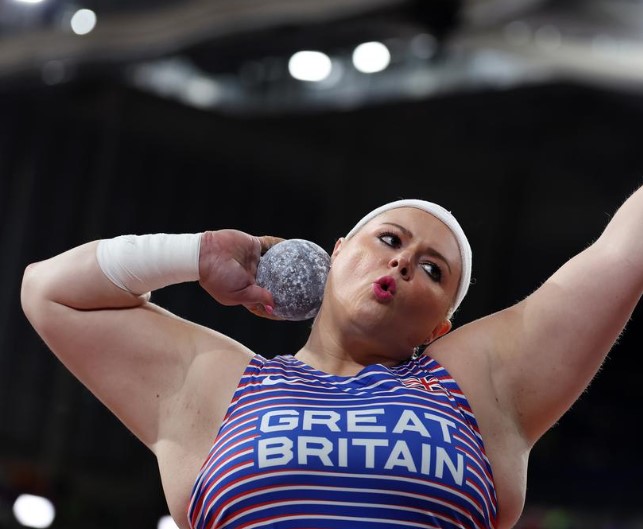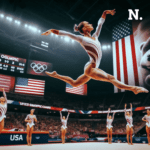Amelia Campbell, a distinguished British shot putter, is contemplating retirement after being omitted from the team for the Paris Olympics. She met World Athletics’ selection criteria but was still excluded. The 30-year-old athlete recently clinched the British title. Despite this, she finds herself among several qualified British athletes overlooked in the latest team announcement.
Campbell expressed her frustration and disappointment in an interview with Reuters. She stated, “I’m very much considering retirement.” Her reasons include not wanting to exert herself physically and mentally anymore. She feels it’s not worth the repeated disappointment she’s faced. I will have been denied seven championships this time around. I also met the Olympic selection criterion for Tokyo. It’s just a joke. It is a joke.”
A Complex Qualification Pathway
World Athletics has implemented a dual-pathway qualification system for the Olympics. Athletes can qualify either by meeting an Olympic standard or through their world ranking. Campbell’s career-best throw is 18.18 meters. This fell short of both the Olympic standard of 18.80 meters and the UK Athletics (UKA) standard of 18.67 meters. The UKA standard is set based on the potential for a top-eight finish. Despite her 38th global ranking, she could have qualified for the 32-thrower field. Each nation is limited to sending only three competitors.
Campbell’s situation is not unique. Other British athletes, including women’s discus thrower Jade Lally, men’s hammer throwers Kenneth Ikeji and Jake Norris, and men’s steeplechaser Phil Norman, also met the world ranking criteria but were excluded from the team due to UKA’s stringent policies. UKA has a policy of declining Olympic invitations for athletes who do not meet their higher standards.
The Heartbreaking Case of Phil Norman
Phil Norman, a men’s steeplechaser, is another athlete affected by UKA’s policies. Norman narrowly missed the UKA steeplechase standard by just 0.15 seconds. Despite winning the British championships last week and breaking a championship record that had stood since 1990, Norman’s appeal against the selection decision was unsuccessful.
Norman shared his sorrow on social media in an emotional post, saying, “This year, I battled every step of the way—both on and off the track—and successfully qualified for my second Olympic games. I was not chosen, though, and my invitation to the Olympic Games will be turned down owing to UKA rules. I fought tooth and nail with the help of legal counsel and the UKA athletes commission to appeal this decision, but unfortunately, my appeal was rejected due to 0.15s over 3,000m.”
Norman, who is in peak physical condition, lamented the emotional toll of the selection process. “I’m not good enough, according to UKA. I am in the same physical form as I have always been. But I’m at my lowest point, both emotionally and psychologically,” he said.
UK Athletics’ Justification
According to UKA, there is no “direct invitation to the athlete to take part” in the Olympics through the World Athletics qualification process. According to a UKA representative, “UKA believes that athletes should only be chosen based on criteria that are identical to those chosen by the direct qualification requirements, that is, those who are able to place in the top eight in their respective events. We acknowledge the disappointment of individuals who fall into this group, but regrettably, there will always be a line when it comes to team selection.
The Broader Impact of Campbell’s Retirement
Campbell emphasized the broader implications of UKA’s decisions, particularly the absence of female throwers in Team GB. “My daughter is a thrower, and she’s really wondering why she should continue to pursue it. She’s so sad that there won’t be any female throwers,” Campbell received numerous messages asking this question. “I find it quite upsetting that they appear uninterested.”
Team GB’s Selected Athletes
Despite these controversies, Britain’s 48-member athletics team for Paris includes notable athletes. Reigning Olympic medallists Keely Hodgkinson (women’s 800 meters), Josh Kerr (men’s 1500m), Holly Bradshaw (women’s pole vault), and Laura Muir (women’s 1500m) are set to compete. In the women’s heptathlon, Katarina Johnson-Thompson was chosen for her fourth Games, while Molly Caudery, the world indoor pole vault champion, will compete in her first Olympics and Jake Wightman, the 2022 world champion, will compete in the men’s 800m.
The Future of British Athletics
The exclusion of athletes like Campbell and Norman highlights the challenges within the current selection system and raises questions about the future of British athletics. As these athletes grapple with the emotional and physical toll of their journey, the decisions made by governing bodies like UKA will continue to shape the landscape of the sport.





